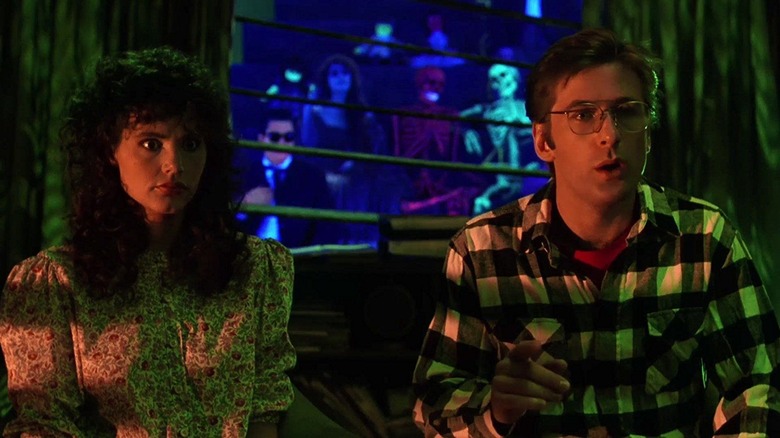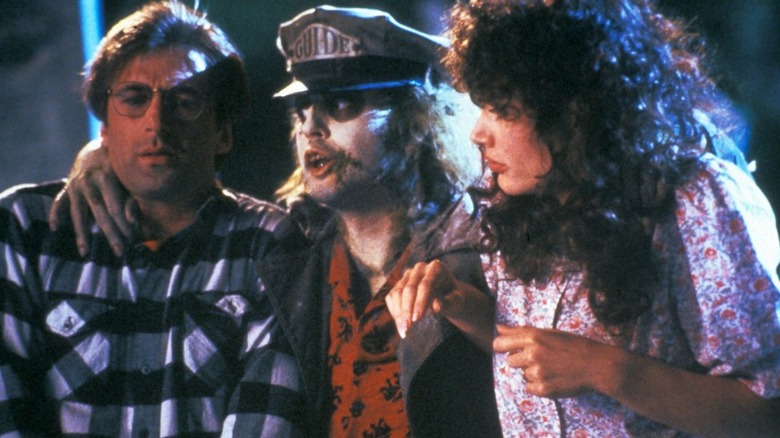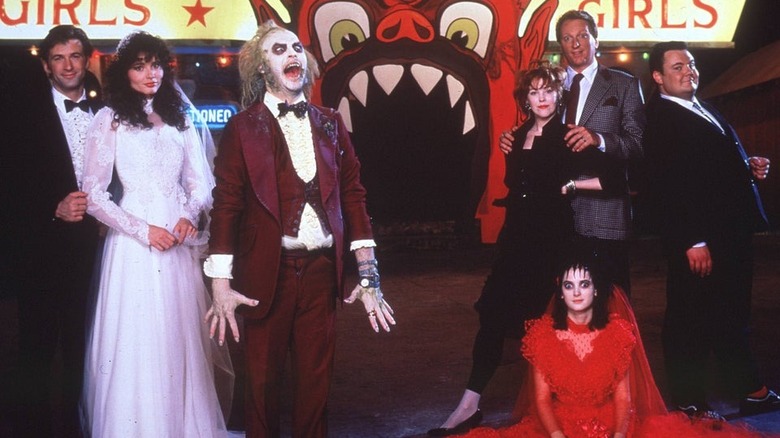Tim Burton Stopped Alec Baldwin From Getting Too Campy In Beetlejuice
Tim Burton's 1988 supernatural comedy, "Beetlejuice," is one of those films that feels like it snuck through the Hollywood system. After all, "a nice New England couple suffer an accidental death, an obnoxious family moves into their old house, and the couple enlists the services of a demon-cum-con artist to try and drive the family away" isn't anywhere near the average elevator pitch. Sure enough, co-writer Larry Wilson had a tough time selling the script, and at one point was even lectured by a Universal executive for attempting to develop "this piece of weirdness." Nonetheless, the screenplay's imaginative comedy resonated with Burton, and his success with 1985's similarly outré film "Pee-wee's Big Adventure" and the popularity of movies like 1984's "Ghostbusters" helped convince The Geffen Company and Warner Bros. to finance the picture.
Even then, Burton had to maintain control of the movie's tone, a difficult task given all the wacky elements and characters it contains. While a majority of the film's cast were given license to camp things up — including and especially Michael Keaton as the eponymous "bio-exorcist" — there had to be a straight man (and woman) for such comedic shenanigans to work properly. It was a fact initially lost on star Alec Baldwin, who had some other plans for his performance before Burton put a stop to them, ensuring "Beetlejuice" wouldn't devolve into a camp free-for-all.
Baldwin tries to turn on the juice, see what shakes loose
Although Burton ended up making a pitch-perfect classic out of the "Beetlejuice" script, it's easy to understand how the cast could be uncertain of such material. As Baldwin recalls, "When we did 'Beetlejuice,' I had no idea what it was about. I thought maybe all of our careers are gonna end with the release of this film." Cast in the role of Adam Maitland, one half of the sweet, average married couple whose journey into the afterlife the film follows, Baldwin observed that "everybody else [in the cast] has got a thing they're doing," and felt adrift. The actor wasn't completely in the dark on Burton's approach — he knew that the director wanted "the ghosts to be the most banal," yet he still believed there was room to stretch his character.
As such, Baldwin pitched the idea that he should play Adam "like Robert Cummings," an actor who rose to fame during the '40s and '50s and was notable for being "a very posh, kind of elegantly spoken man." As seen in this clip from 1957's "The Bob Cummings Show," the performer had a clipped, theatrical vocal quality that Baldwin could easily exaggerate, pushing the camp quality of his character and performance. Baldwin was excited about doing "this whole kind of campy thing," but Burton simply responded, "No. Don't do that." As Baldwin recalls, the remark was "the only direction Tim gave me the entire movie."
A movie that doesn't read like stereo instructions
Baldwin needn't have worried about coming off as "banal" in the film, however, as "Beetlejuice" ended up having enough weirdness to go around for every character. Allegedly, Catherine O'Hara (who portrays Delia Deetz in the film) suggested that calypso music would work best for the film's infamous dinner table musical number, which led to the filmmakers needing a justification for Harry Belafonte's music being in the film, ending up attributing it to Adam's love of the calypso artist.
In addition to his character becoming indirectly responsible for the movie's most famous scene, Baldwin and co-star Geena Davis (playing his wife, Barbara) score a number of huge laughs with their various reactions to the increasingly zany world of the afterlife — Baldwin's Adam even gets to drive a tiny model car to the rescue during the film's finale. As Baldwin recalls, "When you're around Tim, he's such a crazy professor," acknowledging the director's penchant for being experimental — and how his experiments tend to pay off. Let's face it: "Beetlejuice" probably shouldn't have worked, and yet it did, proving that there's life (and an afterlife) for even the most out-there material.


